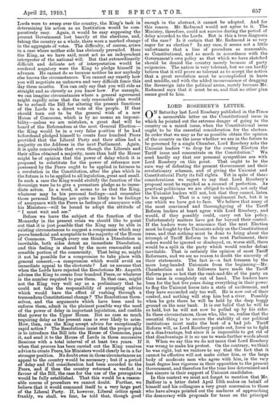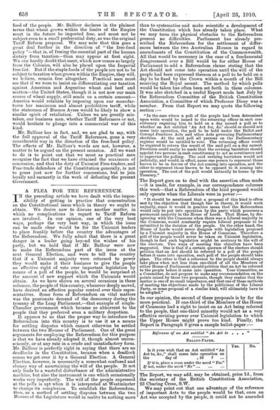LORD ROSEBERY'S LETTER.
ON Saturday last Lord Rosebery published in the Times a memorable letter on the Constitutional issue in which he pointed out the extreme danger of going to the country on a mixed issue, when the Constitutional issue ought to be the essential consideration for the electors. In order that we may as far as possible obtain the opinion of the country on the issue whether we are in the future to be governed by a single Chamber, Lord Rosebery asks the Unionist leaders " to drop for the coming Election the Tariff issue and concentrate on the Constitution." We need hardly say that our personal sympathies are with Lord Rosebery on this point. That ought to be the sure way of defeating the present Government and their revolutionary schemes, and of giving the Unionist and Constitutional Party its full rights. Yet in spite of thess considerations we regret to say that Lord Rosebery's proposal must be regarded as a counsel of perfection. As practical politicians we are obliged to admit, not only that the Unionist leaders will not, but that they cannot, listen to his appeal. That is a very unpleasant fact, but it is one which we have got to face. We believe that many of the most convinced and thoroughgoing of the Tariff Reform leaders at heart agree with Lord Rosebery, and would, if they possibly could, carry out his policy. Unfortunately matters have got far beyond their control. If the leaders were to announce that the next Election must be fought by the Unionists solely on the Constitutional issue, and that nothing must be done to bring about the triumph of Tariff Reform in the next Parliament, their orders would be ignored or disobeyed, or, worse still, there would be a split in the party which would render defeat inevitable. That is certainly the opinion of most Tariff Reformers, and we see no reason to doubt the sincerity of their statements. The fact is—a fact foreseen by the more long-headed Unionists from the beginning—Mr. Chamberlain and his followers have made the Tariff Reform pace so hot that the rank-and-file of the party on this issue is completely out of hand. The leaders have been for the last five years doing everything in their power to flog the Unionist horse into a state of excitement, and they have succeeded only too well. He is now out of their control, and nothing will stop him but a river. Possibly when he gets there he will be held by the deep boggy ground on the near bank. It is our belief that he will be so held, but he will not now be pulled up by his rider. In these circumstances, those who, like us, realise that the essential thing is to secure the stability of our political institutions must make the best of a bad job. Tariff Reform will, as Lord Rosebery points out, force us to fight at a disadvantage, but since it is impossible to get rid of that disadvantage it is no use to waste further words about it. When we say this we do not mean that Lord Rosebery was wrong to make his protest. On the contrary, we think he was right, but we venture to say that the fact that it cannot be effective will not make either him, or the large body of moderate men who agree with him, in the very least degree less vigorous in their opposition to the present Government, and therefore for the time less determined and less sincere in their support of Unionist candidates.
In this context we must not forget to mention that Mr. Balfour in a letter dated April 13th makes on behalf of himself and his colleagues a very great concession to those who have always pointed out the madness of approaching the democracy with proposals for taxes on the principal food -of the people. Mr. Balfour declares in the plainest terms that wheat grown within the limits of the Empire must in the future be imported free, and must not be subject even to a small preferential duty, as was the original Tariff Reform proposal. We may note that this goes a great deal further in the direction of " the free-food policy "—that is, of freeing the essential part of the human dietary from taxation—than may appear at first sight. We can hardly doubt that meat, which now comes so largely from the Colonies, will also be placed upon the Imperial free-list. But if the staple foods of the people are not to be subject to taxation when grown within the Empire, they will, we believe, remain free altogether. Practical men must see that if we were to insist on differentiating our taxation against American and Argentine wheat and beef and mutton—the United States, though it is not now our main source of wheat supply, still sends us a certain amount— America would retaliate by imposing upon our manufac- tures her maximum and almost prohibitive tariff, while the statesmen of Buenos Avres would be likely to show a similar spirit of retaliation. Unless we are greatly mis- taken, our business men, whether Tariff Reformers or not, would hesitate to plunge into a commercial war of this kind.
Mr. Balfour has in fact, and, we are glad to say, with the full approval of the Tariff Reformers, gone a very considerable way in the direction of the free-food policy. The effects of Mr. Balfour's words are not, however, a matter to be argued on the present occasion. All we want to do is to point out that we must as practical men recognise the fact that we have obtained the maximum of concession, and that the duty of Unionist Free-traders, and Free-trade defenders of the Constitution generally, is not to press just now for further concessions, but to join loyally and earnestly in the work of defeating the present Government.















































 Previous page
Previous page